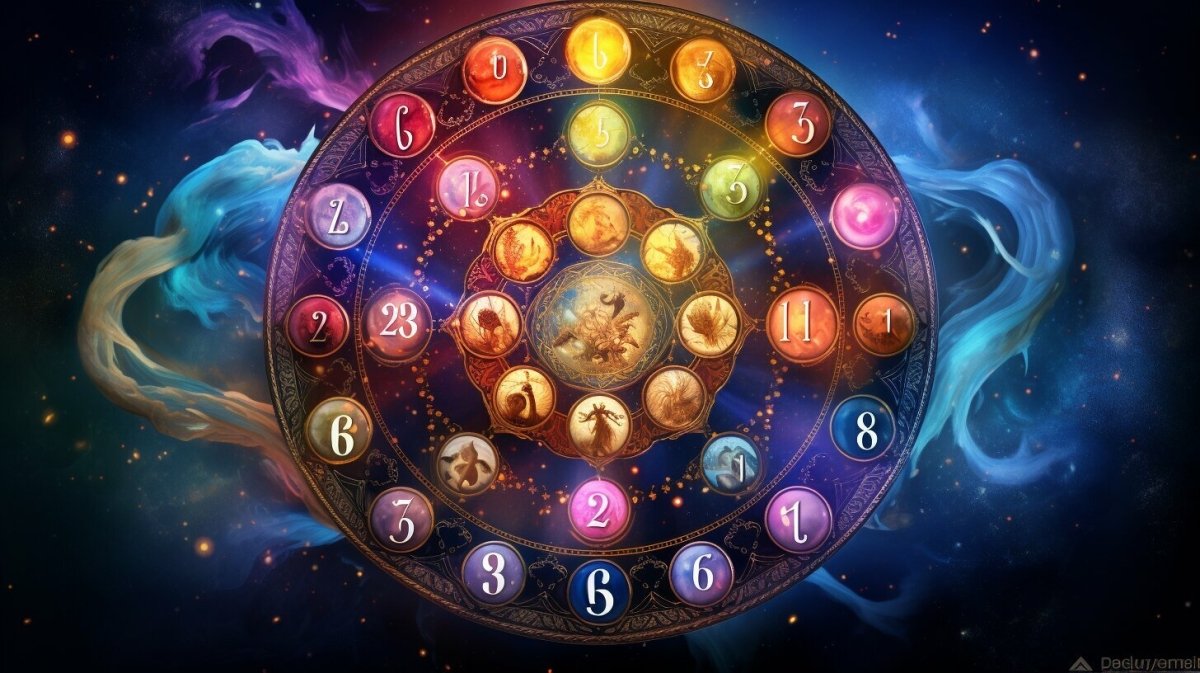
Have you ever been fascinated by the concept of numerology? Are you curious about the potential number of numerology numbers that exist? Look no further, as we delve into the mysterious world of numerology and explore how many numerology numbers there could be.
Numerology is an ancient practice that uses numbers to gain insight into the personality, character, and future of individuals. It has been used for centuries by different cultures around the world, including the Greeks, Egyptians, Babylonians, and Chinese.
Understanding Numerology and Its Numbers
Numerology is the study of numbers and their significance in various aspects of life. It is believed that each number represents a unique vibration and holds a certain energy. Numerologists use these vibrations to gain insights into a person's characteristics, tendencies, and potentials.
The practice of numerology involves reducing larger numbers to a single digit by adding the digits together. For instance, the number 456 would be reduced by adding 4+5+6, which equals 15. To further reduce the number to a single digit, 1+5 would be added together, which equals 6. Therefore, the numerology number for 456 is 6.
How Numerology Numbers Work
Each numerology number has its unique characteristics and meanings. The single-digit numbers, namely 1-9, are the most significant in numerology. However, certain combinations of numbers, such as 11, 22, and 33, are also considered master numbers and hold greater significance.
Numerology numbers are used to gain insights into different aspects of life, such as personality traits, strengths, weaknesses, and life path. They can also be used to identify suitable career options, relationships, and personal development opportunities.
According to numerology, each individual has a life path number, which is derived from their birth date. This number reflects their unique life purpose and the challenges they may face in achieving their goals.
Numerology Number Meanings
Each numerology number holds a specific vibration and meaning. The number 1 represents leadership, independence, and individuality. The number 2 signifies balance, harmony, and cooperation. The number 3 symbolizes creativity, communication, and self-expression. The number 4 represents stability, structure, and practicality. The number 5 represents change, versatility, and adaptability.
The number 6 signifies love, responsibility, and service. The number 7 represents spirituality, intuition, and analysis. The number 8 signifies power, ambition, and success. The number 9 represents completion, wisdom, and humanitarianism.
Master numbers hold greater significance and are considered powerful vibrations. The number 11 represents spiritual enlightenment, intuition, and inspiration. The number 22 signifies practicality, discipline, and manifestation. The number 33 represents compassion, healing, and humanitarianism.
By understanding the meanings and characteristics of different numerology numbers, individuals can gain insights into their unique qualities, tendencies, and potential life paths.
Exploring Different Types of Numerology Numbers
There are various types of numerology numbers used in different numerological systems. Each type has its unique characteristics and contributes differently to the overall interpretation of numerological charts. In this section, we will explore some of the most common types of numerology numbers and their significance.
Life Path Number
The life path number is one of the most well-known numerology numbers. It is calculated based on your birth date and is believed to reflect your life's purpose and direction. This number is often used to gain insight into your personality, talents, and potential career paths.
To calculate your life path number, add up the digits in your birth date (day, month, and year) until you get a single-digit number or master number (11, 22, 33).
| Example: | Birthdate: | Calculation: | Life Path Number: |
|---|---|---|---|
| 1st Example | June 5, 1994 | 6 + 5 + 1 + 9 + 9 + 4 = 34 | 3 + 4 = 7 |
| 2nd Example | December 22, 2000 | 1 + 2 + 2 + 2 + 2 + 0 + 0 = 9 | 9 |
Expression Number
The expression number, also known as the destiny number, is calculated using your full birth name. This number is believed to reveal your natural talents, skills, and potential challenges. It can also give insights into your communication style and how you express yourself to others.
To calculate your expression number, assign each letter in your name a numerical value (use the numerology chart provided in section 4) and add up the digits until you get a single-digit number or master number.
Soul Urge Number
The soul urge number, also called the heart's desire number, is calculated using the vowels in your full birth name. This number is believed to reveal your deepest desires, motivations, and inner feelings.
To calculate your soul urge number, assign each vowel in your name a numerical value (use the numerology chart provided in section 4) and add up the digits until you get a single-digit number or master number.
These are just a few examples of the different types of numerology numbers used in various numerological systems. By exploring these numbers and their meanings, we can gain deeper insights into ourselves and the world around us.
Numerology Number Chart and Calculation
In numerology, a number chart is used to calculate and interpret different numerology numbers. The chart consists of the numbers 1 to 9, with each number having a unique meaning and significance. The calculation of numerology numbers can be done using different methods, such as the Pythagorean, Chaldean, or Kabbalah method.
The Pythagorean method is the most commonly used method in the Western world. It assigns the numerical values of 1 to 9 to the letters of the alphabet, and then calculates the numerology number based on the letters in a person's name or birthdate.
| Letter | 1 | 2 | 3 | 4 | 5 | 6 | 7 | 8 | 9 |
|---|---|---|---|---|---|---|---|---|---|
| Value | A, J, S | B, K, T | C, L, U | D, M, V | E, N, W | F, O, X | G, P, Y | H, Q, Z | I, R |
For example, to calculate the numerology number for the name John Smith, you would assign the numerical values to each letter, add them up, and reduce them to a single digit:
J = 1, O = 6, H = 8, N = 5
S = 1, M = 4, I = 9, T = 2, H = 8
Total = 1 + 6 + 8 + 5 + 1 + 4 + 9 + 2 + 8 = 44
Reduce to single digit: 4 + 4 = 8
Numerology number for John Smith: 8
The Chaldean method is another popular method that originated in ancient Babylon. It assigns different numerical values to the letters of the alphabet based on their sound vibration, and uses a different number chart. The Kabbalah method, on the other hand, is based on Hebrew letters and their mystical interpretations.
Regardless of the method used, the numerology number chart and calculation can provide valuable insights into a person's personality traits, strengths, weaknesses, and life path. It can also be used to analyze the numerology numbers of business names, addresses, and other important aspects of life.
How Many Numerology Numbers Are There?
One of the most frequently asked questions about numerology is how many numbers are there in this mystical system. The answer is somewhat complicated, as the number of numerology numbers varies depending on the method of calculation and interpretation. However, most numerological systems have a range of nine to twelve numbers.
The most popular numerological system is the Pythagorean system which uses the numbers 1 through 9. Each number has a unique meaning and is associated with specific personality traits, life paths, and energies. However, other numerological systems such as Chaldean, Kabbalah, and Chinese numerology use a different set of numbers, which may vary in range and meaning.
It's important to note that different numerological systems may have overlapping or entirely different meanings for the same number. For example, the number 7 in Pythagorean numerology represents spirituality and intuition, while in Chaldean numerology, it represents rest and contemplation.
Some numerologists believe that there may be infinite numerology numbers, as numbers can be combined to form complex patterns and meanings. However, most numerology practitioners prefer to stick to a set range of numbers, to ensure consistency and accuracy in their calculations.
Significance and Uses of Numerology Numbers
Numerology numbers are not just random digits – they carry significant meanings and can be used in many areas of life. Understanding their significance can provide valuable insights into oneself and others, helping to make better decisions and live a more fulfilling life.
Personal Development
Numerology numbers can be used as tools for personal development and self-awareness. By calculating and interpreting one's personal numerology numbers, individuals can gain insight into their strengths, weaknesses, and unique qualities. This self-knowledge can help them make better decisions and take actions that align with their true purpose and goals.
For example, the Life Path Number in numerology is believed to reveal one's life purpose and path. By understanding this number, individuals can gain clarity on their natural strengths and what they need to work on to achieve their goals.
Relationships
Numerology can also be used to gain insights into relationships. By calculating and comparing the numerology numbers of two individuals, one can gain insight into the strengths and challenges of their relationship. This can help them navigate challenges and work towards building a stronger, more harmonious relationship.
For example, the Numerology Compatibility Number can reveal the shared qualities and potential in a relationship. By comparing this number with each partner's personal numerology numbers, individuals can gain an understanding of how compatible they are with each other.
Career Choices
Understanding one's personal numerology numbers can also help in making career choices. By identifying one's strengths and unique qualities through numerology, individuals can align their career choices with their true purpose and potential.
For example, the Expression Number in numerology is believed to reveal one's natural talents and abilities. By understanding this number, individuals can choose a career that is aligned with their strengths and natural abilities, ultimately leading to a more fulfilling and successful career.
Frequently Asked Questions about Numerology Numbers
Do you have questions about numerology numbers? Check out our FAQ section below for quick answers to common queries:
- How can I find my numerology numbers?
To find your numerology numbers, you will need to calculate them based on your birth date and/or name. You can use a numerology calculator online or learn how to calculate them manually using different numerological methods.
- What is the significance of the numerology number 11?
Considered a master number in numerology, 11 represents intuition, spiritual growth, and enlightenment. It is believed to hold a high vibration and can indicate potential for spiritual awakening or spiritual leadership.
- Can numerology numbers predict the future?
No, numerology numbers cannot predict the future. However, they can provide insight into your strengths, weaknesses, tendencies, and potential life path based on the vibrations associated with different numerology numbers.
- What is the difference between life path number and destiny number?
Life path number is calculated based on your birth date and represents your life's purpose and direction. Destiny number, on the other hand, is calculated based on your full name and reflects your potential or ultimate life path.
- Are numerology numbers used in compatibility readings?
Yes, numerology numbers can be used to analyze compatibility between individuals. By comparing and interpreting different numerology numbers for each person, a numerologist can provide insights into the strengths and challenges of the relationship.
- Can numerology numbers help me in my career?
Yes, understanding your numerology numbers can provide insights into your preferred career path, strengths, weaknesses, and potential challenges. It can also help you make informed decisions about career changes or advancements.
Conclusion
Throughout this article, we have explored the fascinating world of numerology and its numbers. We have delved into the basics of numerology, explored the meanings and significance of different numerology numbers, and discussed the various types of numerology numbers used in different numerological systems.
We have also provided step-by-step guidance on how to find and interpret your personal numerology numbers using a numerology number chart and different calculation methods.
So, how many numerology numbers are there? The answer may vary depending on different numerological systems, but what's important is the significance and uses of these numbers in various aspects of life. Numerology numbers can provide guidance and insights into different life situations, including personal development, relationships, and career choices.
Explore Numerology to Gain Deeper Insights
If you have found this article intriguing and informative, we encourage you to explore numerology further. By gaining a deeper understanding of numerology and its numbers, you can gain insights that can help you navigate through life with more clarity and purpose.
Thank you for reading, and we hope this article has shed some light on the mystery surrounding numerology and its numbers.
The Evolution of Numerology Systems
Throughout history, various numerology systems have evolved, each with its unique approach to interpreting numbers. The Chaldean system, which originated in ancient Babylon, differs significantly from the Pythagorean system. It assigns different numerical values based on sound energies and ancient alphabets. On the other hand, the Kabbalah numerology system is rooted in ancient Hebrew letters and spiritual doctrines. Understanding these distinct systems allows enthusiasts to choose the one that resonates most with their beliefs and needs.
Exploring the Role of Zero in Numerology
One intriguing aspect often overlooked in numerology is the role of the number zero. Though not traditionally considered in most mainstream numerology systems like Pythagorean or Chaldean, zero holds significant importance in the Vedic numerology system. Here, zero represents potential and the unknown, embodying the idea that it holds infinite possibilities and can enhance the attributes of other numbers when it appears in combination with them.
Can Numerology Numbers Change Over Time?
A common question is whether a person’s numerology number can change over time. The answer is both yes and no. While core numbers derived from birthdates and full birth names remain constant, other numbers like Personal Year Number or Personal Month Number can change. These dynamic numbers provide insights into specific periods and can be recalculated periodically for more timely guidance.
Numerology in Everyday Life
Aside from personal development, career, and relationships, numerology finds its application in everyday decisions and events. For example, many people use numerology to choose auspicious dates for weddings, business launches, or new ventures. Similarly, selecting house numbers or names that resonate positively with one’s numerology chart is a common practice.
Additional Resources
- Books: "The Complete Book of Numerology" by David A. Phillips and "Numerology: With Tantra, Ayurveda, and Astrology" by Harish Johari are excellent starting points for deep dives into the subject.
- Online Tools: Websites like Numerologist.com offer free tools and calculators for personalized numerology readings.
- Courses: Platforms like Udemy and Coursera offer comprehensive courses on numerology, both for beginners and advanced practitioners.
How Accurate is Numerology?
Another frequent question is regarding the accuracy of numerology. While numerology is not a science, its accuracy is often subjective and relies heavily on the expertise and intuition of the numerologist. Personal experiences and anecdotal evidence suggest that numerology can provide valuable insights and be remarkably accurate in its interpretations of character and life paths.




